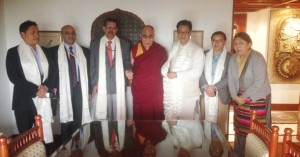
His Holiness the Dalai Lama with Mr Kiren Rijijuji (3rd from R), Mr K K Pathak (3rd from L)
and Dolma Gyari (1st on R)
Photo: Tibet.net
India’s Ministry of Home Affairs organised a workshop to discuss the contents of a seven-page document entitled “The Tibetan Rehabilitation Policy-2014” on November 17 in New Delhi. A delegation of more than 125 Tibetan officials, led by Dolma Gyari who heads the exiled Central Tibetan Administration’s Department of Home, were in attendance. Others who attended the workshop included two joint secretaries from the Government of India, officials from India’s Home Ministry and officials from seven states of India hosting Tibetan settlements.
The workshop was chaired by Shri Kiren Rijiju, India’s Minister of State for Home Affairs. He gave the opening address, which was warmly welcomed as “remarkable” by the Tibetans present. Additionally, Shri KK Pathak, the Joint Secretary of India’s Ministry of Home Affairs, gave a presentation on the gist of the Tibetan Rehabilitation Policy and urged state government officials to reinforce it. The policy was formulated by the Indian government after a series of requests put forth by Central Tibetan Relief Committee (CTRC) officials for solving problems faced by Tibetan refugees settled in India.
Shri GK Diwindi, Joint Secretary of the ministry’s Foreigners Division, and two concerned officials from the Intelligence Bureau, explained the issues around RC, IC, PAP and EXIT Permits. These are related to the registration of Tibetans as foreigners and their overseas travels. Also, any queries and doubts expressed by participants were earnestly answered and clarified by central government officials.
The Tibetan Rehabilitation Policy, finalised last month, makes clear the entitlements of the approximately 100,000 Tibetan refugees living in India. Among the numerous provisions are new benefits available to Tibetans under central and state government welfare schemes, extension of land lease agreements, and the right for Tibetans to undertake economic activity and to pursue any job for which they are professionally qualified. This policy aims to standardise the varying levels of assistance and facilities extended by various state governments.
His Holiness the Dalai Lama later gave an audience to Mr Kiren Rijijuji and Mr KK Pathak to personally express his appreciation and gratitude to the government of India, particularly the Ministry of Home Affairs and the concerned officials who worked to formalise the policy guideline.




 Print
Print Email
Email